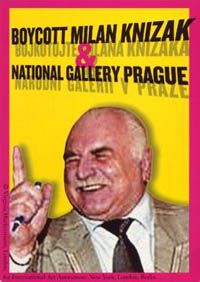
Knížák rejects the critics' objections and does not shy away from the competition
 |
Today, the authors of the petition asked Knížák whether, after nine years at the helm of the gallery, he would not request a competition from the minister himself. "I see no reason why I should ask the minister; you can do that yourselves," Knížák told them at a press conference.
According to signatories represented by artists Tomáš Císařovský and Jiří David and art critic Lenka Lindaurová, the prestige of the gallery under Knížák's leadership continues to decline. They claim the institution exhibits a "trend towards isolation, self-absorption, and insufficient performance in relation to European developments in the field." Knížák today reiterated that criticism of his work has always been driven by personal aversions of critics towards him.
He argued that critics act as if the National Gallery should function as a kunsthalle, i.e., an exhibition hall; however, Knížák perceives the National Gallery as an art museum that, according to him, must address all art, not just current trends. What today's museum should collect is, in his view, problematic, and even directors of major global art museums debate this issue. "Every museum chooses something; no one collects everything. Those who collect the hits of contemporary art are, in my opinion, doing it wrong. We want to be programmatically different; we do not want to succumb to the mainstream," he said.
The directors of different collections within the National Gallery then countered the criticisms of the institution's functioning. In response to allegations that the National Gallery collaborates too little with prestigious foreign exhibitions, whether through co-organizing exhibitions or mutual loans, Vít Vlnas, director of the Collection of Old Art, gave examples such as the exhibitions "Glory of Baroque Bohemia," "Rosary Celebration," or "Silesia, a Pearl in the Czech Crown." "Isolation would be a luxury we cannot afford; that is something only institutions that do not need anyone can afford," he said. However, the criticism in this case relates more to projects in the field of modern and contemporary art.
The director of this collection, Tomáš Vlček, stated that in the area of loans, the National Gallery cooperates with the Museum of Modern Art in New York, with the Vienna Belvedere Gallery, and in the near future, with the British Tate Modern.
Critics also accuse Knížák of allegedly having political support for his position. "I wish that were true - I wish I could gain it for culture and the development of the gallery. If there is any politician who wants to support me, let them do so; I invite them to do it," said the director.
Minister of Culture Václav Jehlička is currently not preparing personnel changes at the helm of the National Gallery. He is reportedly preparing a more effective system for evaluating the activities of his contribution organizations and their directors, to which the National Gallery will also be subjected. Within this, the issue of the method of appointing directors of these organizations will also be addressed. Currently, the directors of the contribution organizations, which include the National Gallery, are appointed for an indefinite period. However, the director of the National Theatre, which is also a contribution organization, is appointed for six years.
The English translation is powered by AI tool. Switch to Czech to view the original text source.
1 comment
add comment
Subject
Author
Date
Narcis Knizak je nesmrtelny....
Jakub Filip Novák
07.05.08 09:57
show all comments









